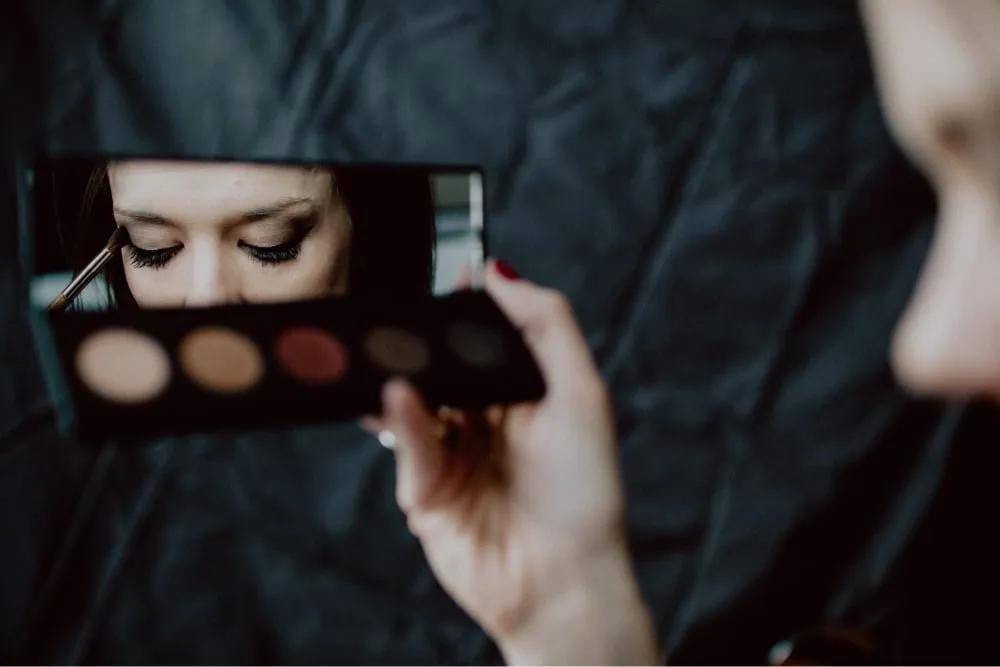What is body dysmorphic disorder?
Body dysmorphia is a mental health condition listed in the Diagnostic and Statistical Manual of Mental Disorders, Fifth Edition (DSM-5), involving a preoccupation with perceived flaws in appearance. These "flaws" are usually exaggerated or sometimes imagined.2
Some people think of BDD as an eating disorder, and while it's frequently connected to disordered eating, body dysmorphia is actually classified under “obsessive compulsive and related disorders.” That's because, similar to obsessive compulsive disorder, body dysmorphia involves obsessive thoughts—about the "flaw" in appearance—and compulsive behaviors, such as mirror checking, skin picking, or excessive grooming, done in response to these thoughts.2
Body dysmorphic disorder can manifest in a number of ways, including muscle dysmorphia, where someone believes they're too small or "scrawny," or beliefs that don't have anything to do with body weight, shape, or size but focus instead on some other perceived physical "flaw."
The level of awareness a person has about the condition can range from acknowledging, at least on some level, that their beliefs are distorted to feeling certain that their beliefs are correct. In either case, these thoughts and behaviors reach the point where they become disruptive and debilitating to someone's everyday life and responsibilities.2
Body dysmorphia signs and symptoms
To have body dysmorphic disorder diagnosed, you must meet the following criteria:2
- Obsession with perceived flaws in physical appearance, which a person perceives to be significant, even though the flaws are not noticeable by others.
- Repeating behaviors, such as asking for reassurance, excessive grooming, or constant comparison to others, to cope with concerns related to appearance.
- Experiencing significant distress or reduced functioning at work or in social situations because of body-related concerns.
Other BDD symptoms may include:1
- Avoiding mirrors
- Attempts to hide or cover oneself in baggy clothing, makeup, hats, scarves, etc.
- Social isolation
- Excessive exercise
- Skin picking
- Undergoing many plastic surgeries
- Not leaving the house
Sadly, many people with BDD also experience anxiety, depression, and feelings of shame, which can be directly related to the disorder, factors that help drive the disorder, or both. In some cases, this can also lead to suicidality.1 That's why it's so important to see a mental health professional if you or a loved one are struggling with these symptoms.
Learn about our results at Within
Go How to know if you have body dysmorphic disorder
Unfortunately, it's a common experience to feel bad about your body or how you look occasionally. So how do you know if you have body dysmorphia?
The biggest difference is the intensity and frequency of these negative thoughts. For people with BDD, thoughts about their perceived "flaw" become a preoccupation; they can be—and often are—hard to control and intrusive. They become so frequent that it makes it hard for them to function in day-to-day life.1,2
There's also a "compulsive" aspect of BDD that might not be present if you're simply unhappy with your appearance. When people with body dysmorphia experience these unpleasant thoughts, they perform compulsive behaviors, such as seeking out reassurance or checking themselves in a mirror, as a response. Like the thoughts themselves, these behaviors can become hard to control, intrusive, and disruptive.
BDD also tends to focus on one perceived physical flaw. Someone will obsess over a scar, or the size of their muscles, or some other specific detail of their body. These "flaws" are usually hard for others to detect and sometimes are entirely imagined. If you feel unhappy about the way you look or your body shape, weight, or size in general, this is also a concerning way to think, but not quite the same thing as body dysmorphic disorder.
Body dysmorphia treatment
If you or a loved one are showing signs of body dysmorphic disorder, it's important to seek out help. The condition can lead to severe depression, suicidal thoughts, and other concerning symptoms. But it's possible to have body dysmorphic disorder treated, and with the right kind of care, you can overcome this mental illness.
Generally, mental health conditions are complex and require a comprehensive treatment approach. With BDD, leading treatments include both psychotherapy and medication.3
Specifically, cognitive behavioral therapy (CBT) is the preferred therapeutic method to help patients overcome distorted thoughts and behavioral patterns, and many BDD patients benefit from a group of medications called selective serotonin reuptake inhibitors (SSRIs), which can help with emotional regulation.3
Treating BDD can help you gain self-confidence and self-esteem and move beyond debilitating thoughts that may be holding you back or trapping you in unhealthy and unhappy patterns.
Treatment that works
If you're struggling with body dysmorphic disorder or any type of eating disorder, help is available. Now you don't have to leave the comfort of your home to attend therapy sessions, talk to a doctor, or to connect with a care team.
At Within, we offer virtual treatment so you can continue to live your life while in recovery. Call us today to learn more.
Call us today What to say to someone with body dysmorphia
It can be hard to watch someone you care about struggle with something as difficult as body dysmorphic disorder. And it can feel impossible to know what to say, as many people with the condition continue to focus on perceived flaws no matter how much reassurance they get from others.
Instead of trying to change their mind about their appearance, it may be more helpful to lead with acceptance. You don't have to see, understand, or agree with how the person sees themselves, but try to recognize that these feelings are very real to the person. This can help encourage empathy and discourage you from passing judgment or seeing the person as vain or self-obsessed.4
Rather than trying to counter their feelings, you can offer more practical support: driving someone to appointments or helping with housework or childcare. Taking time to celebrate successes is important, and encouraging them to continue with treatment, especially during more difficult periods or relapses, can be a great way to show up for your loved one.4
The most important thing you can say is, "I'm here for you." Offering space for someone with BDD to just be or to talk about their concerns in a space free from judgment is often much more helpful than anything you could say.4
Do I have body dysmorphia? Quiz
If you're still not sure if you have body dysmorphia, it may be helpful to take a quiz.
These results are not meant to replace the advice or diagnosis of healthcare providers, and the only way to confirm an issue is to visit a licensed professional. However, the answers may help you think about your viewpoint or behavior and understand if it's time to seek help.
- I often feel self-conscious about the way I look.
- I check my appearance regularly in the mirror or on reflective surfaces.
- When I look in the mirror, I see my “flaws.”
- I try to avoid public and social situations because I feel self-conscious.
- I feel distressed or depressed when I think about my “flaws.”
- I would like to change my appearance.
- I have tried different things to disguise or cover up my “flaws,” such as excessive dieting.
- I find it hard to concentrate on things because I’m thinking about my appearance.
- I often feel unattractive.
- I feel like my appearance affects my everyday life and relationships.







